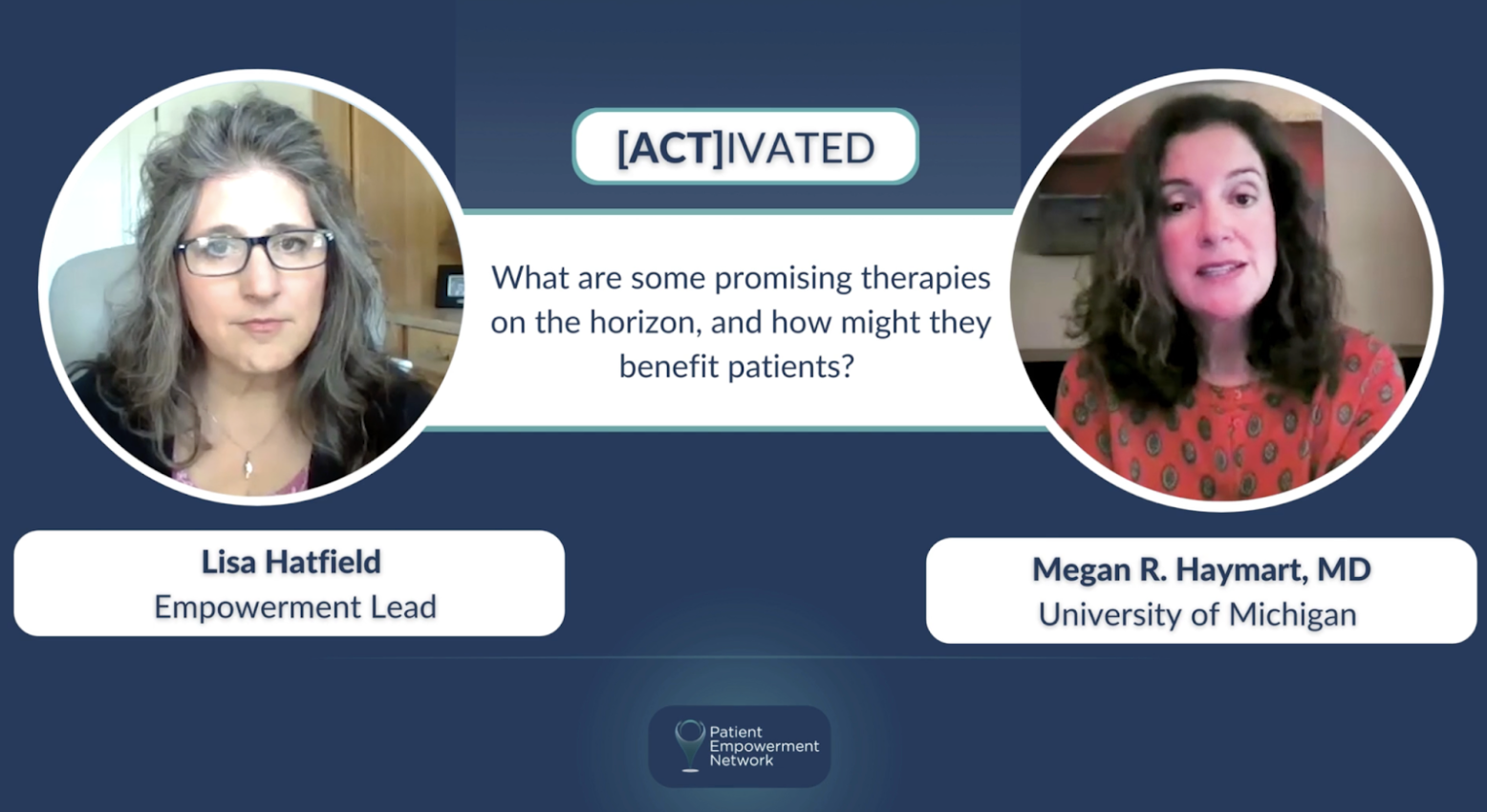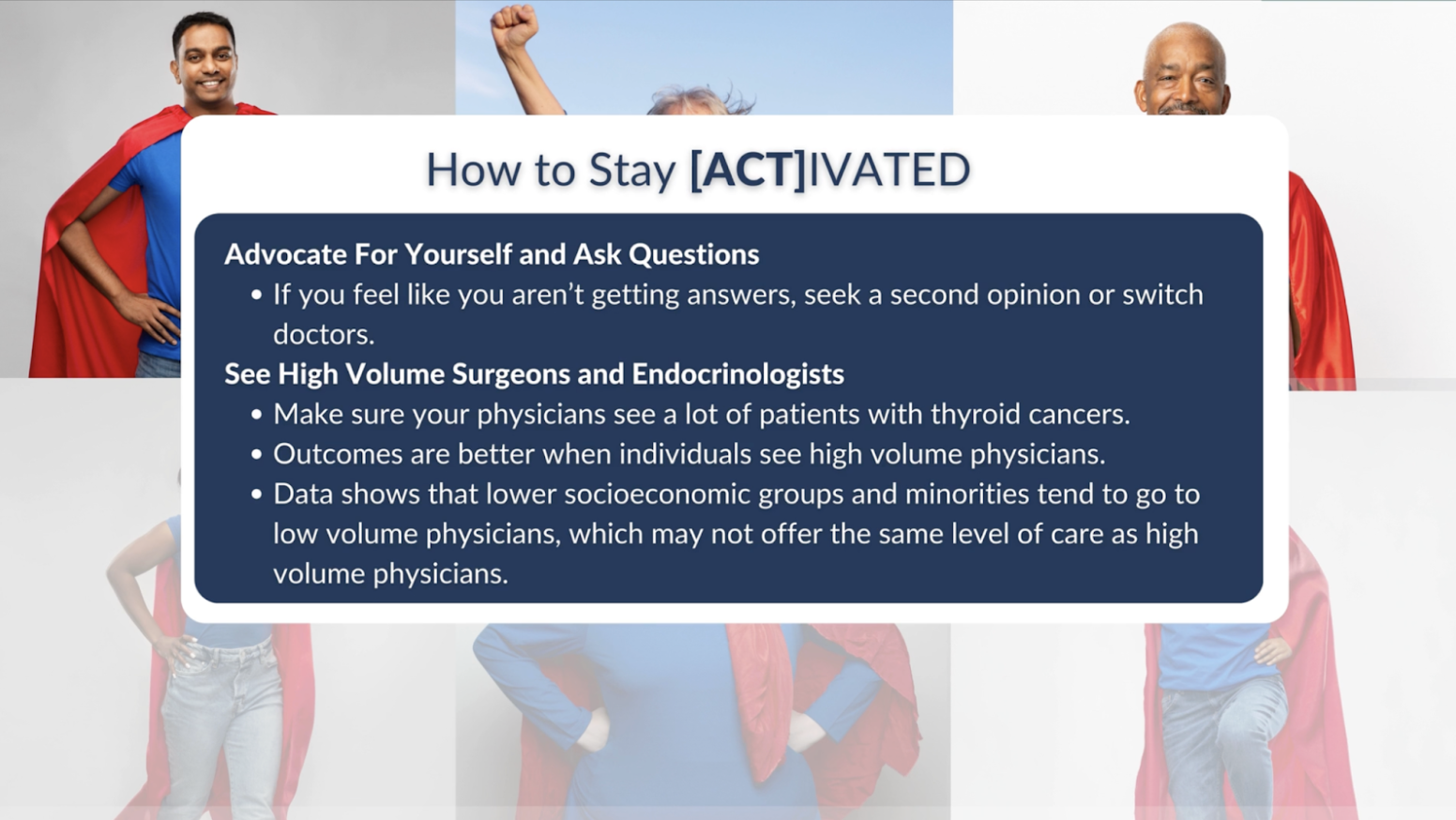Bridging Gaps in Care and Empowering Patients Facing Thyroid Cancer
Patient Empowerment Network (PEN) is dedicated to helping educate and empower patients and care partners in the thyroid cancer community. Thyroid cancer research and treatment options are ever-changing, and it’s vital for patients and families to educate themselves about clinical trials, treatment advancements, barriers to and disparities in care. With this goal in mind, PEN introduced the [ACT]IVATED Thyroid Cancer program, which aims to inform, empower, and engage patients to stay updated about the latest in thyroid cancer care.
Thyroid cancer awareness needs more visibility for multiple reasons. Thyroid cancer incidence is higher in women with 70 to 75 percent of cases occurring in women. And many patients may not be aware that thyroid cancer is the most common cancer in patients who are age 15 through age 33.
PEN is pleased to add information about thyroid cancer to educate more patients and their families. Cancer survivor Lisa Hatfield interviewed expert Dr. Megan Haymart from the University of Michigan as part of the [ACT]IVATED Thyroid Cancer program.

Thyroid Cancer Disparities and Challenges
Thyroid cancer patients may be impacted by a variety of disparities in incidence, diagnosis, and care. Raising awareness about these disparities can help patients and patient advocates work toward closing disparity gaps. Dr. Megan Haymart discussed the thyroid cancer gender disparity that impacts more women than men. “So about 70 to 75 percent of all thyroid cancer cases occur in women. And this is very similar to other endocrine diseases, especially other thyroid conditions. So hypothyroidism, hyperthyroidism, those are also more common in women. And so we think that the reason for this is probably multifactorial. So one, there’s probably something about thyroid conditions in a biologic level that differs between men and women.”
Thyroid cancer patients may be affected by socioeconomic barriers to care. Dr. Megan Haymart discussed potential barriers to optimal care. “And there’s strong data for thyroid cancer and other cancers as well, that sometimes what’s happening is individuals who are lower socioeconomic status or a minority race or ethnicity are sometimes clustering at low volume hospitals. And so they may not be getting the best care because of where they’re going.”
Socioeconomic impacts on thyroid cancer extend to other disparities too. Dr. Megan Haymart shared about a difference that often goes along with socioeconomic status. “And then related to socioeconomic status, we also know that there can be differences based on education level as well.”
Thyroid cancer may feel more overwhelming for young patients. Dr. Megan Haymart shared the different types of stress that young thyroid cancer patients may feel. “…it’s very stressful especially for younger patients who are at a transition point in their life, related to college, related to starting new jobs, related to starting a family, all their friends are healthy and they get a cancer diagnosis, it can be very stressful and overwhelming. And so if you’re worried, if you’re stressed, that’s normal. Patients shouldn’t feel bad about that. No one should make them feel bad about it.”

Thyroid Cancer Care Solutions and Successes
Thyroid cancer care is changing and becoming more personalized to each patient and their preferences for treatment. Dr. Megan Haymart discussed how she’s encouraged about the future of thyroid cancer treatment. “…one that I’m the most excited about with the guidelines is the guidelines are going to emphasize tailored care more and shared decision-making more. And so I think these are key. And so for a lot of thyroid cancer management, there is not one right or wrong treatment option. It depends a little bit on the patient and what their preferences are.”
For thyroid cancer patients, it’s important to see care providers who diagnose and treat a high number of patients with thyroid cancer. Dr. Megan Haymart shared her advice. “…if you feel that you’re not getting the answers that you want, don’t be afraid to get a second opinion…make sure that you’re seeing high volume physicians who see a lot of patients with thyroid cancer. This is for both the surgeons and the endocrinologists, because we know that outcomes are better when individuals see high volume physicians. “
It’s also important for thyroid cancer patients to be comfortable with the care provider and that the provider is truly listening to them. Dr. Megan Haymart shared her expert advice. “…if patients feel like they’re being dismissed, if they’re anxious, if they’re worried, if they’re stressed, if they feel like their questions aren’t being answered, you can always get a second opinion or see someone else.”
Switching to a different thyroid cancer care provider isn’t necessarily as complicated as some patients might think. Dr. Megan Haymart discussed the importance of patients advocating for themselves. “And so I think it’s very important to advocate for yourself and don’t be afraid to look around. And if the center that’s closest to you isn’t the best center for thyroid cancer, and if there’s a better one that’s 30 minutes away, and you’re capable of getting there, I would encourage you to go.”
Delving deeper into the patient experience, PEN’s Thyroid Cancer Empowerment Lead Carly Flumer was diagnosed at the age of 27. And though she experienced many challenges through her cancer journey and still does as a survivor, Carly has also discovered new passions as a result of her experience. “…there have many silver linings of having cancer. I found my passion in helping other cancer patients through different avenues, I’ve made friends and joined communities of people who “get it,” and I found new strength in who I am as a person.” Learn more and connect with Carly here.
[ACT]IVATED Thyroid Cancer Program Resources
The [ACT]IVATED Thyroid Cancer program series takes a three-part approach to inform, empower, and engage both the overall thyroid cancer community and thyroid cancer patient groups who experience health disparities. The series includes the following resources:
Though there are thyroid cancer disparities, patients and care partners can be proactive in educating themselves to help work toward optimal care. We hope you can take advantage of these valuable resources to aid in your thyroid cancer care for yourself or for your loved one.



